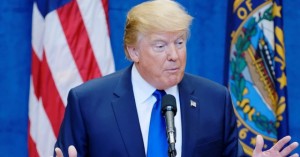Special to WorldTribune.com
Donald Trump’s much ballyhooed foreign policy speech was a minor disaster.
Not only did Trump fail to set out a succinct foreign policy philosophy and agenda, but the speech itself [even with a teleprompter] was a failure in his effort to move to a more “presidential” persona. One can only suppose that the address was the product of several of his relatively undistinguished foreign policy advisers which were never quite molded into a whole. [Significantly, none have so far taken credit] The speech meanders from the overview to specific foreign policy conundrums and then back again, repetitiously.
Far be it for us to be recommending what Mr. Trump should be espousing as his approach to the myriad problems of American policy overseas. But the outline of what those problems are — if not their solution – can be presented relatively concisely.

Paramount, of course, is the problem of an Islam which has gone berserk – again as so many times since Mohammed’s lifetime 1500 years ago – threatening the entire world, not the least the 1.3 billion Muslims, with terrorism. Its origin and nucleus lies in the Mideast and there is where it must be attacked and destroyed rather than an attempt to contain its tentacles around the world.
Secondly, nuclear proliferation with the ensuing threat from unstable regimes continues to be a high priority. That, of course, includes Pres. Barack Obama’s supposed pact with Tehran, as well as a relatively unstable nuclear-armed Pakistan. There is the possibility of new nuclear powers arising in the Persian Gulf now feeling abandoned by their U.S. ally to the threat of Iran’s growing regional hegemony.
The renewed threat of Moscow aggression, even though it now comes from a power much inferior to the old Soviet Union, is pressing. How to reinvigorate NATO in the face of renewed Russian aggression in Georgia, Ukraine, and threats in the Baltic, is part of this bundle. It obviously calls for the reinstitution of the anti-missile defense system, with its bases in Poland and Czechia, which was abandoned as one of the first steps in Obama’s withdrawal of the U.S. from world leadership.
While it may be more apparent than real, Washington must confront the growing military power and what appears to be the growing chauvinistic elements in the Beijing regime. The Chinese economy, miraculous as the last two decades have been, is fragile, and perhaps now poised for a major default. But an ambitious Chinese military is building a blue water navy that challenges the U.S. Navy in the Western Pacific where it has maintained the peace – with the major exceptions of the Korean and Vietnam Wars – for more than half a century. The challenged will have to be met and subtly.
There are a whole host of critical foreign economic issues that could be bundled as the fourth main preoccupation for any foreign policy agenda. Trump’s popularity is in part an expression of the resentment of the loss of American manufacturing and its jobs for the skilled and semi-skilled.
Readjusting trade relations, particularly with China, which has aggressively taken advantage of American initiatives to include “a rising China” in the world economic system, has to be addressed.
The growing failure of the effort to unite continental Europe politically – as well as Britain’s growing ambiguous relationship with the European Union — is impacting on the economic collaboration which was its origin and America’s huge trans-Atlantic commercial and economic interests.
There is the hardly acknowledged problem of the growing power and influence of the United Nations and its secretary-general, a role which was never defined in the early days of the organization and remains ambiguous today. That is true even though the secretary-general has become, willy-nilly, an important arbiter of world politics and the unanticipated crises that arise from it.
While Washington has the official capacity to play a major role in defining UN policy at every level, it too often is left to bureaucratic maneuver rather considered as major policy.
And this, of course, leads into the whole growing need for a redefinition of how foreign policy is made in the U.S. government.
Congressional critics of the amorphous but constantly growing National Security Council and its usurpation of the roles of not only the State Department but the Pentagon and its direction of American military forces is a constitutional issue at the heart of the Republic that must be solved.
It may be, as Mr Obama and his supporters have argued that it is a time for a complete overhaul of the American foreign strategy that has, for the most part, insured peace and stability for more than half a century. But to do so requires a more analytical survey of the world’s problems and the U.S. role than Obama and his advisers have given us.
The same can be said of what Mr. Trump gave us in this speech.
Sol W. Sanders, ([email protected]), is a contributing editor for WorldTribune.com and Geostrategy-Direct.com

